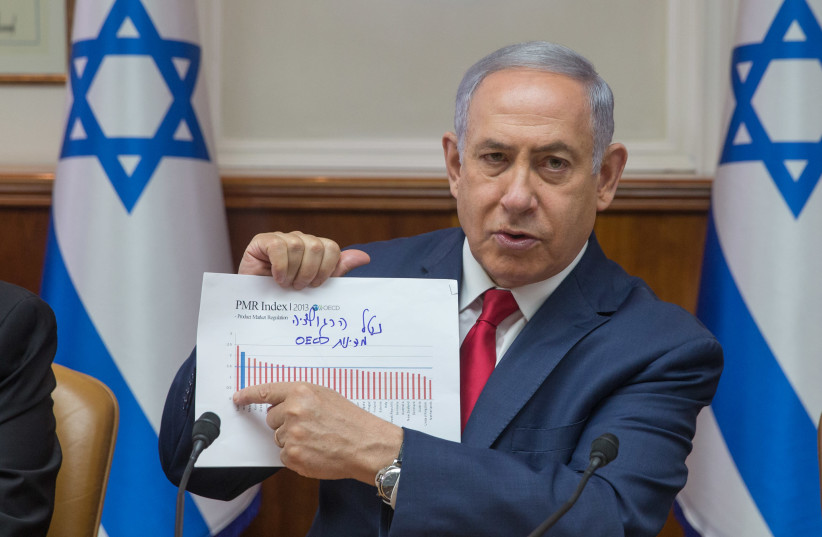Is this the end of the world as we know it? Consider what is happening before our eyes:
For more stories from The Media Line go to themedialine.org
- Hundreds of thousands of Israelis have been demonstrating against their government for two solid months.
- Saudi Arabia and Iran, sworn enemies and captains of their competing Islamic teams, have kissed and made up.
- China has emerged as a leading player in the Middle East, not just selling us cheap trinkets, but also guiding political events like the Iran-Saudi reconciliation.
So yes, the world as we know it is over. But our problem is the way many of us see that world. We tend to judge everything as good or evil, right or wrong, threatening or friendly.
It’s never that clear cut.
The Israeli view on Middle East tensions may be wrong
The longstanding Israeli view (and policy) is that tensions and conflicts among the various Middle East players are a good thing, to be encouraged and provoked. That has been proved ineffective at best, and wrong at worst.

Israel’s decades-long campaign to stop Iran’s nuclear weapons program was a failure – and the failure was orchestrated by its chief cheerleader, Prime Minister Benjamin Netanyahu, and his loyal team of followers. It did get Iran to the negotiating table and produced an agreement that was working, but Israel couldn’t bring itself to declare victory. Instead, it led a crusade against the accord, and then-US president Donald Trump canceled it. So, Iran ramped up its nuclear program again.
And here we are with Iran approaching nuclear weapons capability, as Israel’s traditional ally, the US, blusters while weakening its presence in the region. And into the vacuum steps China.
China brings Iran and Saudi Arabia together, and those enemies pledge to reopen embassies within two months. In return, China gets greater access to oil and a new standing in the region – at the expense of the US.
China has influenced the Middle East: Is this good or bad?
Is all that necessarily bad? Or more to the point, are developments necessarily either all good or all bad? No to both.
Enemies often maintain diplomatic relations. Despite the war in Ukraine, the US and Russia have full diplomatic relations and functioning embassies in their capitals. On-site diplomacy, while somewhat old-fashioned, is still important in defusing tensions and preventing conflicts from escalating.
Saudi Arabia and Iran have many points of conflict, starting with their competing versions of Islam – Sunni and Shia. More concretely, they back opposing sides in Yemen’s endless civil war, where the Iran-backed Houthis have been firing missiles at Saudi Arabia. That’s a more dangerous threat to regional stability than Israel’s little dust-up with the Palestinians – regardless of which conflict receives obsessive coverage in world media.
If establishing relations means the two competing Islamic powerhouses can defuse the conflict in Yemen, that’s already a net gain for the region.
But what about Israel?
But what about Israel? Doesn’t relaxing the pressure on Tehran mean that Iran will go ahead with its plan to attack Israel? Maybe, but not likely. One of the reasons Saudi Arabia agreed to reestablish relations is its concern over Iran’s nuclear program. With an embassy in Tehran, Saudi Arabia can press its case and, more importantly, give Iran something else to lose if it goes ahead with producing nuclear weapons.
Israel would do well to climb aboard this new China train. But for now, at least, its attention is consumed with internal turmoil over the government’s intention to restructure the nation’s judiciary.
Unfortunately, there’s no solution in sight. That’s because many, possibly most, of the hundreds of thousands of Israelis who are thronging to the weekly demonstrations aren’t concerned most of all with the judiciary, even if they don’t realize it. They are appalled by the inclusion of extremists in Netanyahu’s government, one of whom called for wiping a Palestinian town off the map (he later retracted, but too little, too late) and another, an oft-arrested, once convicted militant rabble-rouser who, incredibly, is in charge of Israel’s police.
No cosmetic compromise over the judiciary, or even a comprehensive and necessary overhaul of Israel’s vacuum-friendly, constitution-free legal system, will stop the mass unrest. It’s even doubtful that replacing Netanyahu’s government with a centrist coalition would calm the arena, as long as Netanyahu is there to incite hatred and division, as he has done so well for more than two decades.
Five years from now, we might see an Israel that limps from extremist government to extremist government, each new one abrogating the measures of the previous one, none of them dealing with real issues like the cost of living, housing prices, education, health and relations with the Arab world.
Or we might see a calm post-Netanyahu political scene, with a broad-based government putting aside tribal conflicts and getting down to business for a change.
In either case, a major new player will be standing by, watching and waiting: China.
Whether we like it or not, China is a significant factor in the Middle East. Small countries, even small and powerful countries like Israel, need to roll with that. It means policies based on interests, not emotions.
China has an interest in allying with a strong Israel, with its technological and agricultural capabilities. Israel has an interest in good relations with China, because it’s a power in the Middle East and the world, not to mention a huge market.
Quietly, that’s already happening, with China running Haifa’s port and, of course, Ali Express.
The US, Israel’s traditional ally, might not like that, but it will look the other way – because just like China, the US has a strategic interest in solid relations with powerful little Israel.
Mark Lavie has been covering Israel and the Mideast since 1972. His second book, “Why Are We Still Afraid?” recaps his career and comes to a surprising conclusion.
